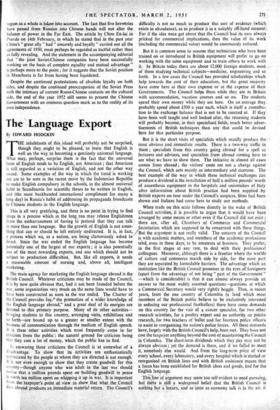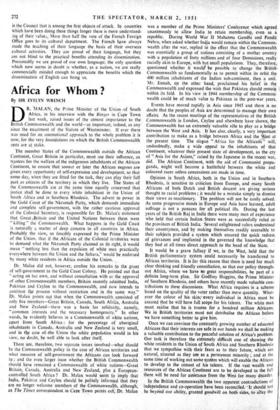The Language Export
By EDWARD HODGKIN
THE inhabitants of this, island will probably not be surprised, though they ought to be pleased, to learn that English is well on the way to becoming a genuinely universal language. What may, perhaps, surprise them is the fact that the universal form of English tends to be English, not American ; that American is still regarded as a variation of English, and not the other way round. Some examples of the way in which the trend is working out are to be seen in the recent move by the Indonesian Republic to make English compulsory in the schools, in the almost universal habit in Scandinavia for scientific theses to be written in English, and (the most backhanded international compliment for many a long day) in Russia's habit of addressing its propaganda broadcasts to Chinese students in the English language.
This is all very gratifying, and there is no point in trying to find snags in a process which in the long Jun may release Englishmen from the embarrassment of having to pretend that they can talk in more than one language. But the growth of English is not some- thing that can or should be left entirely undirected. It is, in fact, a process which we, as a nation, are being clamorously asked to direct. Since the war ended the English language has become potentially one of the largest of our exports ; it is also potentially one of the most rewarding exports, and one which should not be subject to production difficulties. But, like all exports, it needs a reasonable amount of nursing and, above all, intelligent marketing.
The main agency for marketing the English language abroad is the British Council. Whatever criticisms may be made of the Council, it is by now quite obvious that, had it not been founded before the war, some organisation very much on the same lines would have to have been constructed as soon as the war ended. The Charter of the Council provides for/ the promotion of a wider knowledge of the English language abroad," and a great deal of its energies are devoted to this primary purpose. Many of its other activities— bringing students to this country, arranging visits, exhibitions and so forth—are bound up to a greater or smaller extent with the business of communication through the medium of English speech. It is these other activities which most frequently come in for criticism from the public ; the natural ground for criticism being that they cost a lot of money, which the public has to find.
In answering these criticisms the Council is at somewhat of a disadvantage. To show that its activities are enthusiastically A:Irreciated by the people at whom they are directed is not enough. It is not even enough to show that they create goodwill for this 0.11intry—though anyone who was adult in the last war should realise that a million pounds spent on building goodwill in peace Is worth ten million spent on whipping it up in war. It is important from the taspayer's point of view In show that what the .Council do:. abroad produces an immediate material return, The Council's
difficulty is not so much to produce this sort of evidence (which exists in abundance), as to produce it in a suitably off-hand manner: For if the idea once got about that the Council had its ears always pricked for commercial implications, then the value of its work (including the commercial value) would be enormously reduced.
But it is common sense to assume that technicians who have been trained on or introduced to British equipment will prefer to go on working with the same equipment and to train others to work with it. In Britain today there are about 12,000 foreign students, most of them studying technical subjects—medicine, engineering and so forth. In a few cases the Council has provided scholarships which help towards the cost of their education, but the great majority have come here at their own expense or at the expense of their Governments. The Council helps them while they are in Britain with accommodation, vacation courses and so on. The students spend their own money while they are here. On an average they probably spend about £500 a year each, which is itself a contribu, tion to the exchange balance that is not to be sneezed at. If they have been well taught and well looked after, the returning students Will probably become, in their specialised fields, much better adver- tisements of British techniques than any that could be devised here for that particular purpose.
But it is the short visits of specialists which usually produce the most obvious and immediate results. There is a two-way traffic in them ; specialists from this country going abroad for a spell as lecturers and advisers, and specialists from abroad coming here to see what we have to show them. The initiative in almost all cases comes from abroad ; the visitors' costs are not a charge against the Council, which acts mainly as intermediary and cicerone. The best example of the way in which these technical exchanges can produce a dividend is the installation of half a million pounds' worth of anaesthesia equipment in the hospitals and universities of Italy after information about British practice had been supplied by British experts on tour under the Council's auspices, films had been shown and Italians had come here to study our methods.
When trade on this scale follows directly in the wake of British Council activities, it is possible to argue that it would have been arranged by some means or other even if the Council did not exist ; there are, after all, Chambers of Commerce and Commercial !Secretariats which are supposed to be concerned with these things. But the argument is not really valid. The concern of the Council is with academic matters, and members of the academic professions tend, even in these days, to be amateurs at business. They prefer, in the first stages at any rate, to deal with their professional colleagues. Moreover, although there is a frontier where the worlds • of culture and commerce march side by side, for the most part they are separated by formidable barriers. The advantage which an institution like the British Council possesses in the eyes of foreigners' (apart from the advantage of not being " part of the Government " —which is considerable) is that it can almost always provide an answer to the most widely assorted questions—questions at which a Commercial Secretary would very rightly boggle. Thus, in recent years, from the one country of Colombia (a land which most members of the British public believe to be exclusively interested in seducing our professional footballers) there have come demands on this country for the visit of a cancer specialist, for two other research scientists, for a poultry expert and an authority on potato research, for two teachers of ballet and for fourteen police officers to assist in reorganising the nation's police forces. All these demands have, largely with the British Council's help, been met. They have not cost the taxpayer anything beyond the cost of maintaining the Council in Colombia. The short-term dividends which they pay may not be always obvious ; yet the demand is there, and if we failed to meet it, somebody else would. And from the long-term point of view every school, every laboratory, and every hospital which is started or reorganised on British lines and with British assistance means that a focus has been established for British ideas and goods, and for the English language.
This line of argument may seem too self-evident to need pursuinf, but there is still a widespread belief that the British Council is nothing but a luxury, and as soon as economy talk is in the air. it
is the Council that is among the first objects of attack. lo countries which have been doing these things longer there is more understand- ing of their value.. More than half the vote of the French Foreign Office goes to its cultural department. The French have always made the teaching of their language the basis of their overseas cultural activities. They are proud of their language, but they are not blind to the practical benefits attending its dissemination. Presumably we are proud of our own language; the only question which now seems in doubt is whether, as a nation, we are really commercially minded enough to appreciate the benefits which the dissemination of English can bring us.



































 Previous page
Previous page